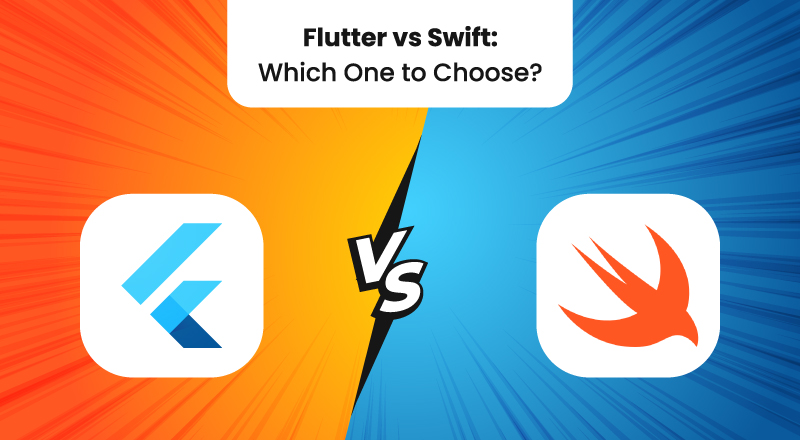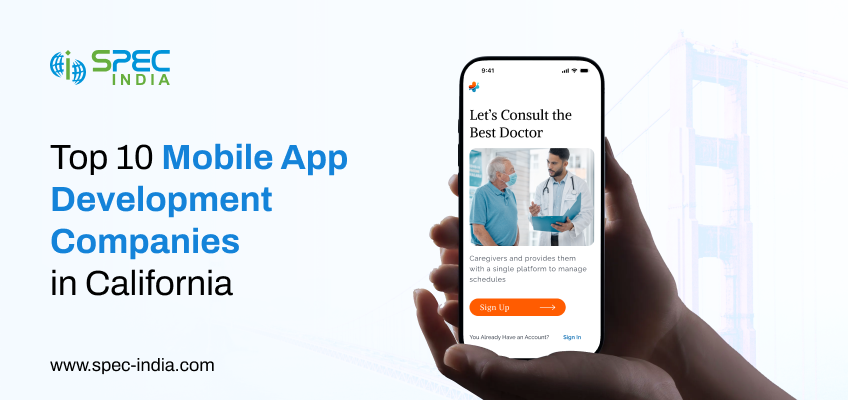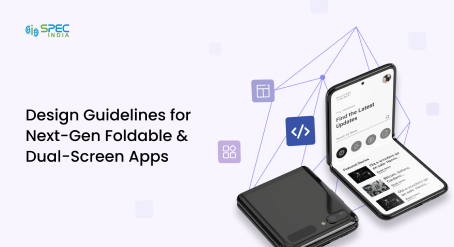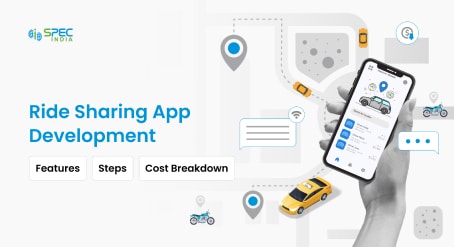Flutter vs Swift: Which One to Choose?

There is no looking back at the expansion of the global app market. The global mobile application market size was valued at USD 206.85 billion in 2022 and is expected to grow at a compound annual growth rate (CAGR) of 13.8% from 2023 to 2030.
With the horizons of mobile applications expanding, the market of iOS app development will keep spreading far and wide. Here comes the time to analyze popular iOS development tools, and as we talk about that, the two names often compared are Flutter and Swift.
Both frameworks have a loyal client base and have been proving their worth for a long time. Hence, comparing the world of Flutter app development and Swift app development is a perplexing equation.
This article examines the two popular iOS programming languages—Swift and Flutter—and explains their intricacies. This will help you decide which one to choose and why for your iOS development objectives.
What is Flutter App Development?
Flutter is an open-source framework by Google for building beautiful, natively compiled, multi-platform applications from a single codebase. As a free and cross-platform UI toolkit, it assists in reusing code across different operating systems. It is based on Dart, yet another object-oriented language from Google.
Flutter lets you build two versions of the application simultaneously. It is more like a platform for creating applications that consist of Dart as a programming language and other widgets. Developers can write code faster with Flutter on multiple platforms. It establishes a type-safe framework with features like layout rendering, high performance, etc.
Flutter helps in the seamless creation of cross-platform applications through a unified codebase. It is ideal for novices and experienced programmers because of its variety of Flutter widgets. It offers excellent productivity and helps in enhancing performance. It is regarded as a perfect platform for creating intuitive applications.
Key Features of Flutter
- Enriched widgets
- Single codebase
- Hot reload feature
- Open-source and cross-platform
- Google Firebase support
Advantages of Flutter
- Supports old devices
- High speed and performance
- Wider reach with fast time to market
- Apps for multiple platforms with the least effort
- Strong language and robust tools
- Extension and documentation support
- Clean syntax and development approach
- Faster learning curve
- Easy integration with editors
- The fast development of interfaces
What is Swift App Development?
Swift is a powerful and intuitive programming language for iOS, iPadOS, macOS, TVOS, and watchOS. Writing Swift code is interactive and fun. The syntax is concise yet expressive, and Swift includes modern features developers love. It empowers developers to create their own iOS-powered devices.
It is a modern, secure, high-performance language that is easy to write apps in and suitable for native iOS app development. Its fast and intuitive programming style, easy maintainability, and readability make it a developer’s delight. It has an expressive syntax with modernized features.
The entire ecosystem of Swift app development services and its tools helps create faster apps with robust and communicative development capabilities. It offers intensive documentation that helps novices learn faster. The primary environment needed to build native apps with Swift is Xcode.
Flutter or Swift
Which framework is best for iOS app development?
Key Features of Swift
- Simplistic syntax
- Compatible with Objective-C
- Multiple return values
- Functional programming patterns
- Package manager
Advantages of Swift
- Dynamic library support
- Extensive documentation
- Open source community
- Good tooling support
- Easy code readability
- High performance and speed
- Supported by multiple devices
- Exceptional user experience
- Offers powerful functionalities
- Dynamic library support
Flutter vs Swift: Organizations Using Them
Companies Using Flutter
Google Ads, Philips Hue, Realtor.com, Alibaba, Groupon, Square, eBay, Reflectly, Hamilton Musical, Tencent, Google Assistant, Cryptomaniac, SpaceX Go, and many more.
Companies Using Swift
Asana, Lyft, Slack, Airbnb, Facebook, WhatsApp, Uber, Firefox for iOS, LinkedIn, SlideShare, Eventbrite, Robinhood, DoorDash, Twitter, Firefox for iOS, and many more.
As we observe the intricacies of Flutter app development services and Swift app development services, there are similarities, as mentioned below, and specific differences that make them distinct in their own ways. Let us have a look at them:
Flutter vs Swift: The Similarities
- Static language type
- Open source and free to use
- Object-oriented with stability
- Real-time changes are possible
- High-performance tools
- Good community support
- High-quality documentation
- Easy access to skilled resources
Flutter vs Swift: Which One is Better for iOS Development?
| Parameters |
Flutter |
Swift |
| Overview |
Open source, UI, cross-platform software development kit |
High-level, multi-paradigm compiled iOS programming language |
| Release Year |
2017 |
2014 |
| Developed By |
Google |
Apple |
| Cross Platform Compatibility |
Yes |
No |
| Native Development |
No |
Yes |
| IDE Involved |
Visual Code, Android Studio, IntelliJ |
Xcode |
| UI Builders |
Flutter UI Toolkit |
Swift UI |
| Accessibility |
Supports accessibility for external tools; Flutter needs development to offer better applications for people with disabilities with accessibility support. |
With built accessibility support for iOS apps, programmers offer reliable data availability to each UI component in the iOS application using the UI Accessibility method. |
| Performance |
Highly performant because of support from the Dart properties |
It is highly performant because it is essential for iOS apps |
| Ease of Use |
Easy to use because of the simple Dart language |
Easy to use because of extensive documentation |
| Application Size |
The file size is around 52 MB, larger than the Swift apps |
The file size is around 25 MB, lighter than Flutter apps |
| Testing Support |
Inbuilt testing support |
Native testing tools like XCTest |
| Development Time |
Performs consistently after cleaning and development time |
Performs consistently throughout the cleaning and development time |
| Integration With |
Nevercode tool – automated setup and configuration, support for multiple platforms |
Jenkins tool – easy installation and easy configuration, Changeset support |
| Learning Curve |
There is a simple learning curve if exposure to Java and Kotlin exists, with good documentation to support it. |
A complex learning curve if not exposed to iOS app development. |
| Architecture |
Flutter’s architecture is based on three major components – engine, platform, and framework |
Swift’s architecture is based on Ruby, CLU, C#, Python, and other projects |
| Costs Involved |
Less expensive |
More expensive |
| Onboarding Process |
Flutter needs macOS + Xcode + Flutter Binary, an easy onboarding process |
Swift needs macOS + Xcode, a slightly complex onboarding process with a code editor, simulator, etc. |
| Reloading |
Real-time changes can be made |
Hot Reload for real-time changes |
| Application Size |
Large-sized apps |
Flexible-sized apps |
| GitHub Stars |
116k |
55.4k |
| Forks |
16.5k |
8.9k |
| Time to Market |
Flutter is fast after the initial clean builds, but slow at the start |
Swift is speed and agile, as per its name |
| Ecosystem |
Large ecosystem of plugins and third-party packages |
Large ecosystem of tools, libraries, and frameworks |
| Reusability |
Easily reusable widgets and components, resulting in faster development and easy maintenance |
Easily reusable code across Apple platforms, APIs, and frameworks, enabling effective development |
| User Interfaces |
Customizable and responsive user interfaces with pre-built UI widgets and components |
iOS native user experience with customizable and responsive UI kit and components |
| App Profiling |
Helps developers to profile iOS apps through the IDE or the command line |
Helps developers to profile iOS apps in Xcode with Instruments |
When should you use Swift or Flutter for iOS app development?
Swift app development can be used when
- A high-functioning application needs to be created
- There is a complicated architecture with higher expectations
- Users need a perfect native iOS app with different features
Flutter app development can be used when
- There is a need to develop an MVP product or prototype
- Developers need to explore popular marketplaces
- There is a need to maintain a singular codebase
Swift vs Flutter: As We Wind Up
As you compare the two tech stalwarts—Swift vs. Flutter—there is no ‘one size that fits all’ solution. Many factors could influence the selection of the language. Here are some of them: tool accessibility, project deadlines, skilled resources, budget and timelines, API levels, smooth integration, accessibility to flexibility, speed, and performance.
Both Swift and Flutter are competent in creating feature-rich iOS apps. The significant difference is that Swift is constructed for initial native iOS apps, while Flutter is designed for developing hybrid apps.
As a renowned Flutter app development company, we offer widespread Flutter app development services for building progressive, highly functional applications that can reform your business practices.
Hire our Flutter Developers, who are competent at transforming your requirements into a rational, business-ready application with an attractive and high-quality user interface.
As a famous Swift app development company, we build convincing and secure apps for servers, desktops, phones, and other devices. Leveraging Swift app development services, we focus on enterprises and smaller businesses across the industry domains.
Hire our qualified Swift developers to attain the business aim through robust and quality software solutions that are secure, scalable, and superior.
Contact us for any application development or hiring services in Flutter app development or Swift app development. When you compare Flutter vs. Swift, whichever you choose, you are leveraging the best of the best!
SPEC INDIA is your trusted partner for AI-driven software solutions, with proven expertise in digital transformation and innovative technology services. We deliver secure, reliable, and high-quality IT solutions to clients worldwide. As an ISO/IEC 27001:2022 certified company, we follow the highest standards for data security and quality. Our team applies proven project management methods, flexible engagement models, and modern infrastructure to deliver outstanding results. With skilled professionals and years of experience, we turn ideas into impactful solutions that drive business growth.






